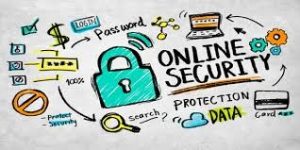PROTECTING YOURSELF ONLINE
 Hacking has almost become a routine thing for America, and since many of us spend a great deal of time on the computer, it behooves us to take some extra time to reduce our chances of becoming a victim. These are just some of the steps you can take:
Hacking has almost become a routine thing for America, and since many of us spend a great deal of time on the computer, it behooves us to take some extra time to reduce our chances of becoming a victim. These are just some of the steps you can take:
CREATE STRONG PASSWORDS: Strong passwords are an important key to protecting against opportunistic hackers using brute force attacks, wherein a computer uses every possible password combination until it finds the correct one. Consider the following when creating a strong password:
- ALWAYS change the default password on any account or electronic device.
- NEVER use “password”, “letmein”, “qwerty”, “123456” or any similar easy-to- guess phrase.
- NEVER use the name of a partner, child or pet; notable dates such as birthdays and anniversaries; or a favorite sports team or school mascot.
- ALWAYS use a mixture of upper/lower case letters, numbers, and special characters, and don’t use common words from a dictionary without modifying them with numbers and special characters. Some companies now insist on a combination of upper/lower case letters mixed with numbers and special characters and require it to be at least eight characters long before they will accept your password.
- NEVER use the same password across multiple websites.
USE STRONG SECURITY QUESTIONS: Security questions are often used to reset accounts if the user can’t remember his or her password or must verify the account. Consider the following tips when choosing a security question:
- ALWAYS choose the question that would be the most difficult for someone to guess the answer. You will know the answer but don’t make it easy for anyone else.
- ALWAYS avoid picking answers that are public records, can be found online or in your social media, or known to family or friends.
- ALWAYS answer in complete sentences when possible. For instance, if the security question asks for your first pet’s name, you could answer, “My first pet was a mutt named Joe” instead of just “Joe”.
- ALWAYS modify an answer when possible using numbers or special characters wherever you can. A user may enter his or her hometown as “T@11aha$$33” for Tallahassee.
OTHER HELPFUL HINTS:
- LIMIT the number of companies that have your personal information. Don’t provide your personal information just because they ask for it.
- DON’T take the bait from a phishing scam – like “Click here to update your account”, or “Click on the link below to verify your account information”. Instead, go directly to the company to see if an update is needed.
- NEVER click on an emailed link from a financial institution. This will include your bank, all credit cards and any payment program such as PayPal. Always access your financial accounts directly with the company’s website.
- LOOK for the lock – if your connection is secure, you will see a locked padlock in the address bar of your web browser and the “http” will say “https” instead, indicating the connection is secured.
If you need assistance with this or any other concern, contact your nearest Seniors vs. Crime office. You will find phone numbers and days of operation on our website, at https://seniorsvscrime.com. You can also check out our Facebook page by searching for Seniors vs. Crime Region 4.
